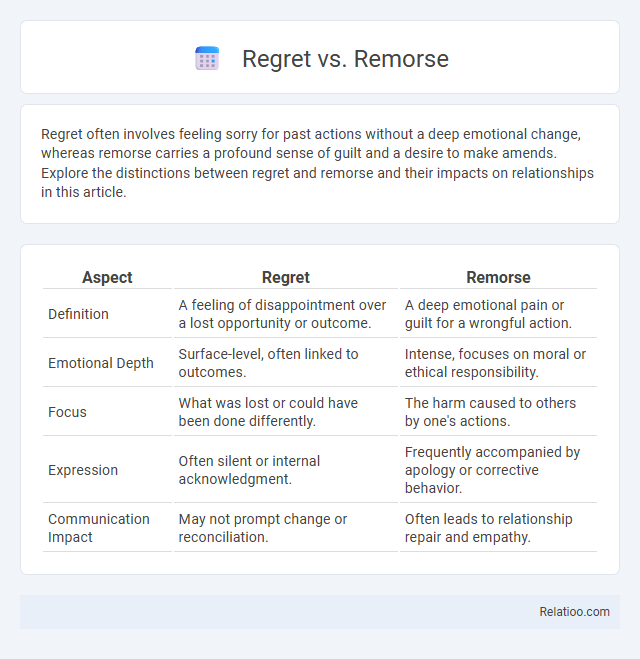Regret often involves feeling sorry for past actions without a deep emotional change, whereas remorse carries a profound sense of guilt and a desire to make amends. Explore the distinctions between regret and remorse and their impacts on relationships in this article.
Table of Comparison
| Aspect | Regret | Remorse |
|---|---|---|
| Definition | A feeling of disappointment over a lost opportunity or outcome. | A deep emotional pain or guilt for a wrongful action. |
| Emotional Depth | Surface-level, often linked to outcomes. | Intense, focuses on moral or ethical responsibility. |
| Focus | What was lost or could have been done differently. | The harm caused to others by one's actions. |
| Expression | Often silent or internal acknowledgment. | Frequently accompanied by apology or corrective behavior. |
| Communication Impact | May not prompt change or reconciliation. | Often leads to relationship repair and empathy. |
Understanding Regret and Remorse: Key Definitions
Regret involves feeling sorrow or disappointment over a past action or decision, often without a deep emotional connection to the consequences. Remorse, however, carries a stronger emotional weight, reflecting genuine guilt and empathy for the harm caused by your actions. Understanding these distinctions helps you better process your feelings and make more mindful choices moving forward.
Psychological Foundations of Regret and Remorse
Regret and remorse are distinct emotions rooted in different psychological foundations; regret involves a cognitive evaluation of past decisions leading to a wish for alternative choices, while remorse carries a deeper moral and empathetic dimension, often accompanied by a desire to make amends. Regret primarily activates brain regions associated with decision-making and counterfactual thinking, such as the orbitofrontal cortex, whereas remorse engages areas linked to social cognition and emotional processing, including the anterior cingulate cortex and insula. Understanding these distinctions helps clarify how individuals process past actions and motivates behavioral change in therapeutic contexts.
Emotional Responses: How Regret Differs from Remorse
Regret involves feeling disappointed or sorrowful about past actions or outcomes, often accompanied by a wish to change the situation, but it may lack a deep emotional connection to the harm caused. Remorse is a more profound emotional response marked by guilt and empathy for those affected, prompting a genuine desire for amends or restitution. Unlike general regret, remorse emphasizes moral conscience and emotional responsibility for the consequences of one's behavior.
Causes and Triggers of Regret vs Remorse
Regret often stems from missed opportunities or poor decisions causing personal disappointment, while remorse is triggered by the recognition of harm inflicted upon others, leading to guilt and a desire for amends. Causes of regret include unfulfilled goals or choices that negatively impacted your future, whereas remorse arises from moral awareness and empathy for those affected by your actions. Understanding these triggers helps you address emotional responses effectively and fosters personal growth.
The Role of Personal Responsibility in Regret and Remorse
Personal responsibility plays a crucial role in distinguishing regret from remorse, as regret often involves a feeling of sorrow for an outcome but may lack acknowledgment of one's own role in causing it. Remorse, however, embodies a deeper sense of personal accountability, where individuals recognize their mistakes and experience a genuine emotional response tied to their actions. This recognition of responsibility drives remorse to motivate more profound change and reconciliation compared to the more passive nature of regret.
Regret and Remorse in Moral Decision-Making
Regret and remorse are crucial emotions in moral decision-making, where regret reflects a recognition of a poor choice affecting outcomes, while remorse involves a deeper emotional response tied to guilt and empathy for those harmed. Your ability to experience remorse can lead to meaningful moral growth by motivating reparative actions and fostering genuine accountability. Regret alone signals dissatisfaction but lacks the moral depth that remorse provides, making it less effective in guiding ethical behavior.
Consequences: Effects on Mental Health and Relationships
Regret often leads to feelings of disappointment and missed opportunities, impacting your mental health by causing stress and decreased self-esteem. Remorse involves a deeper emotional response tied to guilt, which can drive positive change but also result in anxiety or depression if unresolved. Recognizing these differences helps improve relationships by enabling effective communication and emotional healing, preventing long-term damage caused by unresolved negative feelings.
Cultural Perspectives on Regret and Remorse
Cultural perspectives shape the expression and interpretation of regret and remorse, with many Eastern cultures emphasizing collective harmony and viewing remorse as a vital step toward social reconciliation, while Western societies often stress individual accountability in experiencing regret. In collectivist cultures, such as Japan or China, remorse is linked to the restoration of group relationships and is publicly demonstrated through formal apologies. Conversely, in individualistic cultures like the United States or Western Europe, regret is commonly internalized as personal reflection on choices, highlighting differences in emotional processing and social expectations across cultural contexts.
Overcoming Regret and Remorse: Coping Strategies
Overcoming regret and remorse requires identifying the emotions associated with past actions and understanding their impact on your mental health. Effective coping strategies include practicing self-compassion, seeking support through therapy or support groups, and engaging in mindfulness techniques to stay present. You can also transform regret into growth by setting actionable goals that align with your values and learning from past mistakes to prevent repetition.
Choosing Growth: Turning Regret and Remorse into Positive Change
Regret often involves feeling sorrow for past actions, while remorse carries a deeper emotional weight of guilt and responsibility, both powerful catalysts for personal growth. You can transform these feelings into positive change by reflecting on mistakes, learning from them, and committing to better decisions moving forward. Embracing this mindset allows for emotional healing and fosters resilience, turning regret and remorse into opportunities for self-improvement and meaningful development.

Infographic: Regret vs Remorse
 relatioo.com
relatioo.com